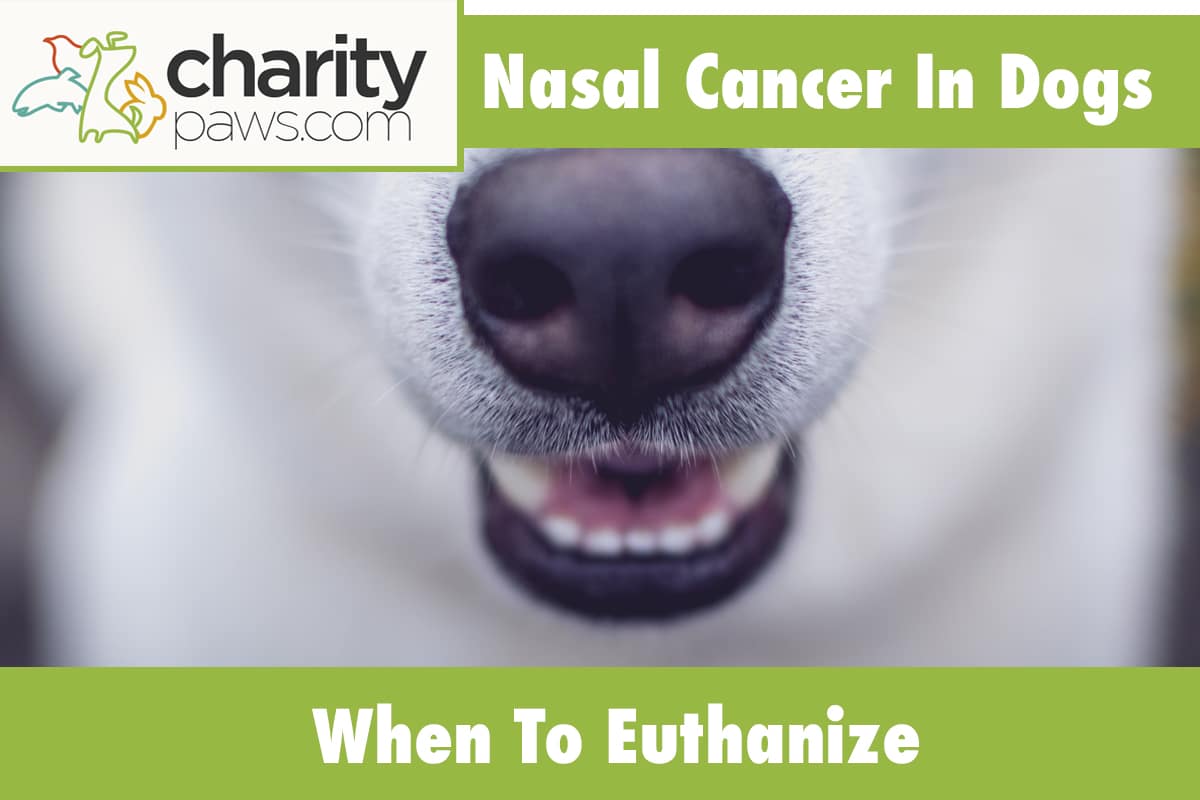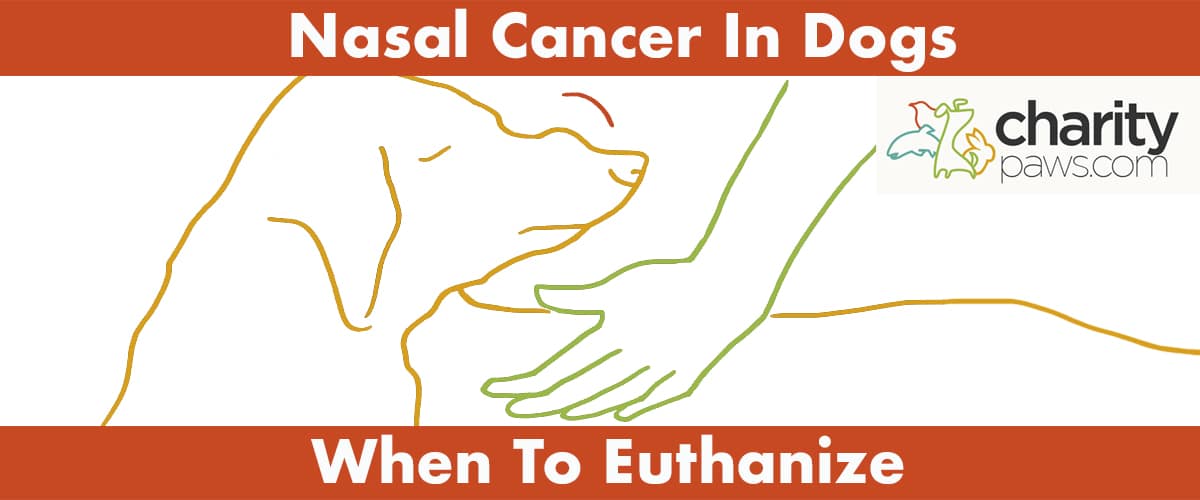If your dog has been diagnosed with any form of nasal cancer, you are likely researching every aspect of their condition.
Though it’s important to understand the options in extending your pup’s life, it’s also essential to understand when it may be time to say goodbye.
Nasal tumors are known to be incredibly invasive cases, so quality of life is typically something that will need to be discussed at some point.
In this article we will discuss the details of nasal cancer in our beloved dogs, and help you better understand when it may be time to say goodbye to your dog with nose tumors.
What Is Nasal Cancer In Dogs?

A nasal tumor in dogs is a cancer that develops as a result of changes to the cells in the nasal passageway.
Nasal adenocarcinomas are the most common nasal tumors seen in dogs, but these tumors can originate from cancers of all kinds.
Nasal tumors are known to be extremely invasive when they occur, meaning they can invade all portions of the nasal cavity and surrounding structures of the face.
Because of this, nasal cancer in dogs is considered a serious and life altering diagnosis.
Is Nasal Cancer Common In Dogs?
Thankfully for our furry friends, nasal tumors are not that common.
Only about 1% of cancer cases in dogs affect the nasal cavity, making this low on the list of things we expect to see in our furry friends.
However, just because it is rare does not mean it should be ruled out at any point.
If your pup is ever experiencing any of the symptoms we will discuss below, it is important to seek guidance from your veterinarian as soon as possible.
As we mentioned above, this type of cancer is typically aggressive and invasive when it does occur.
Why Do Dogs Get Nasal Cancer?
Just like any other type of cancer, there is never an exact cause of nose cancer in dogs.
Most cases of nasal cancer are complex and lacking explanation, but there are some risk factors that are known to contribute to the development of the disease.
Some of the potential causes of nasal cancer in our canine friends include:
- Exposure to cigarette smoke
- Living in urban environments with pollution
- Chronic upper respiratory conditions
- Hereditary history of nasal cancer
Exposure to the risks above does not mean that your dog will develop nasal cancer, but they have been linked to some pups with the disease.
If your pup has been diagnosed with cancer of the nose, it may be helpful to think about any potential risk factors that were present in their life.
Symptoms Of Nose Cancer In Dogs
Nasal cancer in dogs should not be the first thing that comes to mind with each sneeze, but it is important to be aware of any concerning clinical signs.
Nose cancer in dogs can vary in stages, meaning there will likely be an array of symptoms based on the progression of each dog’s disease.
To help you better spot some of the signs, let’s list a few of the most common symptoms of nasal cancer in dogs below.
Potential signs of nasal cancer in dogs include:
- Nasal discharge, ranging in color from yellow to blood tinged
- Sneezing
- Noisy breathing
- Sudden onset of snoring
- Nose bleeds
- Coughing
- Swelling of the face, especially around the nose
- Anorexia
- Lethargy
- Wound on the nose
- Odor from the face
- Neurological symptoms such as strange behavior, circling, and seizures
- Weight loss
If you notice any of the symptoms above, we suggest reaching out to your vet for further guidance.
Even if nasal cancer is not the cause of your dog’s symptoms, these signs can point to the presence of other serious medical conditions.
Early Stage Of Nasal Cancer In Dogs
Just like any other type of cancer seen in our furry friends, nasal cancer in dogs will have different stages.
These stages range from stages 1-5, with 5 being the most severe progression of the disease.
These stages are determined based on which structures of the body have been impacted at the point of diagnosis.
Dogs in the early stage of their disease may not be cured of the condition, but they typically have the longest survival time from the point of diagnosis.
When a veterinarian determines that a dog is in the early stages of their cancer, this typically means they have either stage 1 or 2 nasal cancer.
Stage 1 nasal cancer refers to a dog with only turbinate destruction (the bone structure in the nose that is covered by a mucous membrane), and stage 2 refers to a dog with damage beyond just the turbinates, often with damage to the orbit (bony cavity that contains the eyeballs) or other nasopharyngeal extensions.
Can You Treat Nasal Cancer In Dogs?
There are a few different treatment methods that can offer a dog with nasal cancer more time, but the options will vary based on how advanced their disease is.
It’s also important to note that most cases of nasal cancer cannot be cured with treatment, so these options will simply offer your pup more time if they are successful.
To help you better understand the most common treatment options available for dogs with nose cancer, let’s discuss some of the standard routes below.
It’s important to remember that not every treatment method will be acceptable for your dog’s case, so it’s best to trust your veterinarian’s guidance.
Radiation
Radiation is now considered one of the most effective ways to reduce tumor size in dogs with nasal cancer.
Not only can radiation slow the progression of the disease, but it can relieve discomfort as the tumor shrinks.
Most radiation therapy is performed under general anesthesia 4-5 days per week, with this being continued for 3-4 consecutive weeks.
Dogs with successful radiation treatments can be offered survival times of up to 1.5 years, but this is the best case scenario.
Chemotherapy
Chemotherapy can be offered to patients in addition to radiation therapy, as well as on its own.
Chemotherapy is typically recommended if a dog is diagnosed with a cancer that is known to metastasize, as radiation therapy can only target one area.
Chemotherapy can also be offered if the pet owner is unable to pursue radiation therapy, as this can still increase a dog’s survival time.
However, this route will not shrink the tumor itself, so this factor will need to be considered.
Surgery
While surgery was once one of the primary treatment options for dogs with nasal tumors, it is now considered less than ideal if it is not used in addition to radiation therapy.
Data has now shown that opening up the nasal passageway may actually decrease survival time in some cases, potentially making the condition more challenging to treat in the long run.
However, every case is different, and surgery may be one of the best options if it can remove portions of a tumor that is impacting a dog’s quality of life.
Your vet knows your dog’s case best, so we suggest following your vet’s guidance.
Palliative Care
If your dog is receiving palliative care, this means that your vet is determining the best plan of action to offer them comfort in the time they have left.
This means providing pain relief, treating and preventing infections, small doses of radiation or chemotherapy, and even steroids.
End Stages Of Nasal Cancer In Dogs
As we mentioned above, the staging of a dog’s nasal cancer measures how many regions of the body have been impacted by their disease.
If a dog is diagnosed with end stage nasal cancer, this typically means their cancer has spread to the cribriform plate (bone that separates the brain from the nasal cavity), they have lymph node involvement, or their form of cancer has metastasized to other parts of the body.
Due to the severity of these conditions, most dogs have anywhere from 2 to 8 months of survival time when treatment is implemented.
Though a dog’s life can be extended when exploring different treatment routes, it’s important to consider quality of life in dogs with end stage nasal cancer.
Many times their disease is invasive and painful, leading many owners to question if they should move forward.
Your veterinarian will be honest with you about what’s best for your pup in this situation, so we always suggest relying on them for appropriate guidance.
Life Expectancy Of A Dog With Nasal Cancer
Like all other forms of canine cancer, the standard life expectancy of a dog with nasal tumors will vary based on the type of tumor, the stage of the cancer, and the overall health condition of the dog affected.
The life expectancy will also depend greatly on the type of treatment that is offered, or if any treatment is pursued at all.
Though a dog’s life expectancy varies based on the factors above, the average expectancy for nasal cancer in dogs is anywhere from 2 to 18 months.
Pursuing treatment obviously increases your pup’s survival time, but this will rely on how early the cancer was detected.
When To Euthanize A Dog With Nasal Cancer

If you think your dog may be beginning to suffer from their disease, you may be asking yourself whether or not it is time to say goodbye.
Quality of life will often need to be discussed at some point when a dog is diagnosed with nasal cancer, as it is rare for treatment to abolish the disease completely.
We understand how difficult it can be to determine when it is time to euthanize your dog with nose cancer, so we will discuss some of the most common signs of a dog suffering from their disease below.
It may be time to discuss euthanasia with your vet if your dog is experiencing any of the following symptoms:
- Frequent nosebleeds that are challenging to stop
- Recurring nasal infections
- Difficulty breathing
- Anorexia, or even difficulty eating
- Significant facial swelling
- Weight loss
- Lymph node swelling
- Lethargy
- Disorientation
- Seizures
- Blindness
- Changes in behavior
If your dog is experiencing any of the above symptoms, or you believe they are beginning to suffer in any way, it may be time to discuss euthanasia with your veterinarian.
Your vet knows your pup best, so they can help you make an educated decision on your dog’s care.
Find where to euthanize your dog for free
Final Thoughts
Nasal cancer in dogs is a complex and devastating disease.
Be sure to discuss all treatment options that are appropriate for your dog’s case, and you can feel confident in making the best decision for your pup.


I am thankful for this article as it has helped to make the decision of euthanizing our beloved pet a little easier. He’s suffering from nasal cancer and recently just had a grand mal seizure. Even though the seizure’s have been controlled with medication, our vet has suggested the most humane thing to do is allowing him peace so he no longer struggles to breathe. The guilt is phenomenal however your educative article has helped me feel more secure with the decision.
Thank You
My dog had radiation and made it over a year before he started having nasal problems. His nose now bleeds all the time and his cancer is now progressive. They suggested palliative radiation but I am not sure if his nasal tissue will continue to be aggravated even with the radiation. It has not spread but is starting to get into the bone around the nose. We are not sure what to do.
Hi Debbie – I didn’t realize that palliative radiation would be an option after treating radiation. Our oncologist and also CSU told us that wouldn’t be a good idea. There is a treatment chemo that we tried (Toceranib) – but it made him too tired and he went into hiding. At this point, we are trying to enjoy our days with him – as we know they are numbered. We have him on low dose prednisone twice a day to help him feel better. I wish you the best in making your decision. It’s very tough 🙁
My dog had extensive adenocarcinoma cancer in his nose and received intense targeted 3 days of radiation in July 2021. He did fine until early this year when he began to bleed. His ct revealed the cancer had returned and growing – is starting to crack the cribiform plate and encroach in ocular area. He seems mostly happy but more lethargic – we started him on Toceranib to try to slow growth and he is tolerating that well. He has several episodes of coughing and honking which last a minute or two a couple times a day – he is extremely panicked and stressed during this time, as are we. How do I know when I need to condsider euthanasia? I don’t want him to start seizing. Just so hard to think he is suffering 🙁
When is the time to euthanize will be the hardest decision you have to make. On one hand you want your pup to live with you forever and can’t bare the thought of them leaving. But on the other hand you don’t want them to suffer. When it comes to euthanizing your dog who has cancer in his nose, it will always come down to “quality of life”. Is he suffering? Can he still enjoy most days? His he still happy? Is he sleeping all of the time, losing weight, not eating or seems panicked often? These are the questions you need to ask yourself. Your veterinarian can be your best guide on how to ‘truthfully’ answer these questions as well as what their opinion is on timing.
Thank you for your thoughtful response. I think it is not time yet….I took him off the chemo pill and his behavior has returned to ‘mostly’ happy – with brief periods of distress (minutes a day)…. when those minutes become longer and more often – then it will be time 🙁